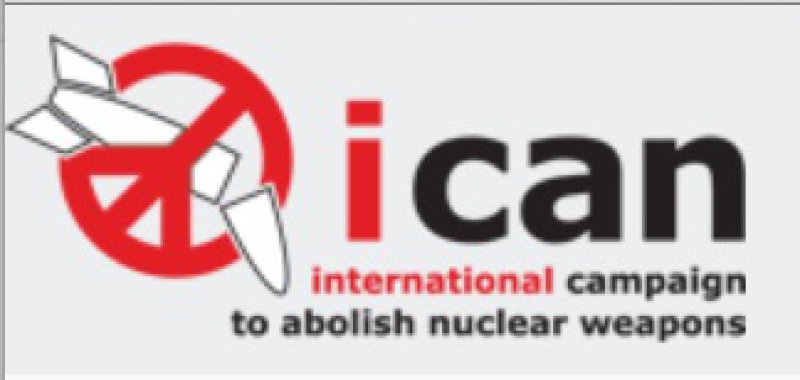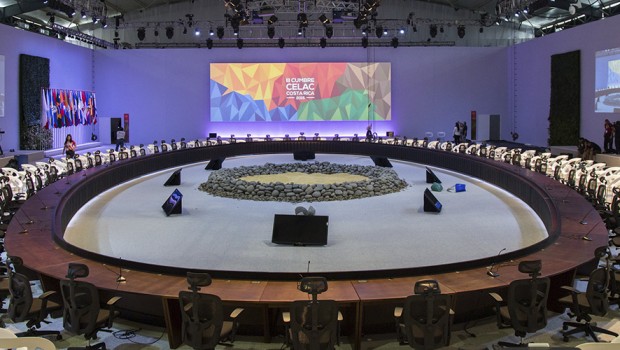33 Latin American and Caribbean States Call for a Nuclear Weapons Ban Treaty
WEAPONS OF MASS DESTRUCTION, 2 Mar 2015
International Campaign to Abolish Nuclear Weapons – TRANSCEND Media Service
Latin American and Caribbean states [CELAC] have once again shown a united front and a clear vision for the future of nuclear disarmament.
At the third annual summit of the Community of Latin American and Caribbean States (CELAC), heads of state of all 33 countries, issued a declaration fully supporting the outcomes of the Third International Conference on the Humanitarian Impact of Nuclear Weapons in Vienna last December and formally endorsing the Austrian Pledge. The Austrian Pledge, delivered by the deputy foreign minister of Austria at the end of the Vienna Conference, recognised the existence of a “legal gap” in the international framework regulating nuclear weapons and called on all states to join in efforts to fill this legal gap by pursuing measures which would stigmatise, prohibit and lead to the elimination of nuclear weapons.
CELAC is the first regional group of states to recognise that a treaty banning nuclear weapons is the best option to fill this gap:
“As has been demonstrated by the testimonies of survivors and evidence and scientific data, nuclear weapons constitute a serious threat to security, development of peoples and civilization in general. Being consistent with our declarations, in this purpose we reiterate our strong support to call made in Vienna and Nayarit to initiate a diplomatic negotiation process of an internationally legally binding instrument for the prohibition nuclear weapons.”
Carlos Umaña of IPPNW Costa Rica, an ICAN partner organisation, notes that, “With the CELAC Declaration, Latin American and Caribbean states have recognised they intend to remain at the forefront of efforts which bring us closer to a world without nuclear weapons. The Treaty of Tlatelolco, which established a nuclear weapons free zone across the region, was the first multilateral treaty to prohibit nuclear weapons in a region — now Latin American and Caribbean states intend to work to promote a similar process that bans nuclear weapons internationally.”
For decades, discussions on nuclear weapons have been dominated by the few nuclear-armed states – states that continue to stockpile and maintain over 16,000 warheads. The humanitarian initiative on nuclear weapons has prompted a fundamental change in this conversation, with non-nuclear armed states leading the way in a discussion on the actual effects of the weapons.
According to Daniel Högsta of ICAN, “the Austrian Pledge is a rallying call for states to demand action to fill an unacceptable legal gap. The momentum generated by the humanitarian initiative is paving the way for the commencement of a process to ban nuclear weapons. CELAC states have added their voices to the call. We expect other regions to do the same.”
DISCLAIMER: The statements, views and opinions expressed in pieces republished here are solely those of the authors and do not necessarily represent those of TMS. In accordance with title 17 U.S.C. section 107, this material is distributed without profit to those who have expressed a prior interest in receiving the included information for research and educational purposes. TMS has no affiliation whatsoever with the originator of this article nor is TMS endorsed or sponsored by the originator. “GO TO ORIGINAL” links are provided as a convenience to our readers and allow for verification of authenticity. However, as originating pages are often updated by their originating host sites, the versions posted may not match the versions our readers view when clicking the “GO TO ORIGINAL” links. This site contains copyrighted material the use of which has not always been specifically authorized by the copyright owner. We are making such material available in our efforts to advance understanding of environmental, political, human rights, economic, democracy, scientific, and social justice issues, etc. We believe this constitutes a ‘fair use’ of any such copyrighted material as provided for in section 107 of the US Copyright Law. In accordance with Title 17 U.S.C. Section 107, the material on this site is distributed without profit to those who have expressed a prior interest in receiving the included information for research and educational purposes. For more information go to: http://www.law.cornell.edu/uscode/17/107.shtml. If you wish to use copyrighted material from this site for purposes of your own that go beyond ‘fair use’, you must obtain permission from the copyright owner.
One Response to “33 Latin American and Caribbean States Call for a Nuclear Weapons Ban Treaty”
Read more
Click here to go to the current weekly digest or pick another article:
WEAPONS OF MASS DESTRUCTION:


CELAC is not quite the first. In 1986 Pacific Island Governments agreed to the South Pacific Nuclear Free Zone Treaty: https://www.iaea.org/sites/default/files/publications/documents/infcircs/1986/infcirc0331.pdf